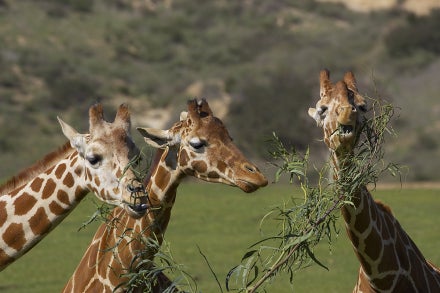
In the final hours of World Elephant Day at the Safari Park, just before midnight on August 12, 2018, female elephant Ndlulamitsi gave birth to Umzula-zuli, a male calf, called "Zuli." Keep an eye out for the little guy on Elephant Cam. Newborn elephant calves seem a bit silly at first because they are sort of clumsy until they fine-tune their coordination, but they actually develop pretty quickly. At birth a baby elephant, called a calf, is usually quite hairy. It usually measures three feet (one meter) tall and weighs 198 to 265 pounds (90 to 120 kilograms).  In general, a young calf is standing on its own about one half hour after birth and can walk on its own about one hour later. It takes a bit longer to get to the nipple and suckle for the first time because this requires a dual effort with the mother, but calves usually accomplish this within 10 hours of birth. Then they begin to grow and grow and grow. A baby elephant puts on about 2 to 3 pounds a day during their first year of life! Baby elephants spend their days practicing making all four legs go in the same direction at the same time, perfecting their ear flaring, and mastering the all-important trunk control. It takes quite a few days for the little one to get the hang of coordinating all 40,000 muscles in that trunk!
In general, a young calf is standing on its own about one half hour after birth and can walk on its own about one hour later. It takes a bit longer to get to the nipple and suckle for the first time because this requires a dual effort with the mother, but calves usually accomplish this within 10 hours of birth. Then they begin to grow and grow and grow. A baby elephant puts on about 2 to 3 pounds a day during their first year of life! Baby elephants spend their days practicing making all four legs go in the same direction at the same time, perfecting their ear flaring, and mastering the all-important trunk control. It takes quite a few days for the little one to get the hang of coordinating all 40,000 muscles in that trunk!  The day after he was born, Zuli followed his mother into the main habitat to meet the rest of his herd. They gathered round, touching and sniffing him, and trumpeting in joyous welcome. For the first few months, the calf is very dependent upon its mother and other members of the herd.
The day after he was born, Zuli followed his mother into the main habitat to meet the rest of his herd. They gathered round, touching and sniffing him, and trumpeting in joyous welcome. For the first few months, the calf is very dependent upon its mother and other members of the herd.  If you watch as Zuli moves among the herd, you’ll see that Zuli's mom and aunts are keeping an eye out that all is well. You're also likely to see some slightly smaller and obviously younger elephants close at hand (...er, trunk). These young females are Zuli's half-sisters—and his babysitters! As he grows up and strays away from Ndlulamitsi, his babysitters will make sure he plays and stays safe, as will the other elephants in the herd. Despite all the playtime and protection, calves still have to navigate through social nuances and establish their social rank within the herd. Be sure to check the Elephant Cam during breakfast, lunch, coffee breaks...anytime you need an elephant sized (even a baby elephant sized) dose of adorable. Tune in and watch Zuli zoom and thrive! Wendy Perkins is a staff writer for San Diego Zoo Global.
If you watch as Zuli moves among the herd, you’ll see that Zuli's mom and aunts are keeping an eye out that all is well. You're also likely to see some slightly smaller and obviously younger elephants close at hand (...er, trunk). These young females are Zuli's half-sisters—and his babysitters! As he grows up and strays away from Ndlulamitsi, his babysitters will make sure he plays and stays safe, as will the other elephants in the herd. Despite all the playtime and protection, calves still have to navigate through social nuances and establish their social rank within the herd. Be sure to check the Elephant Cam during breakfast, lunch, coffee breaks...anytime you need an elephant sized (even a baby elephant sized) dose of adorable. Tune in and watch Zuli zoom and thrive! Wendy Perkins is a staff writer for San Diego Zoo Global.




